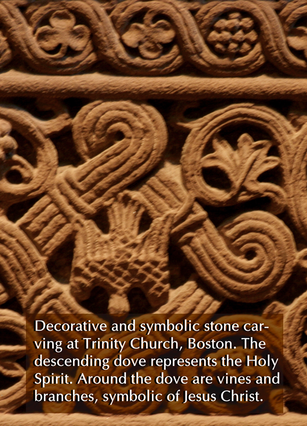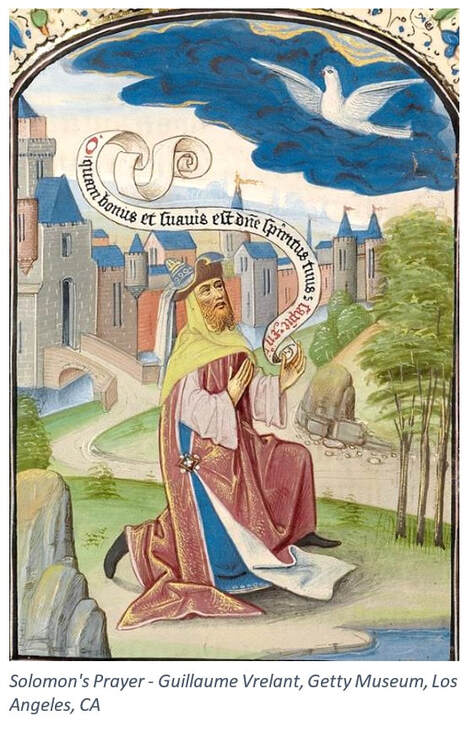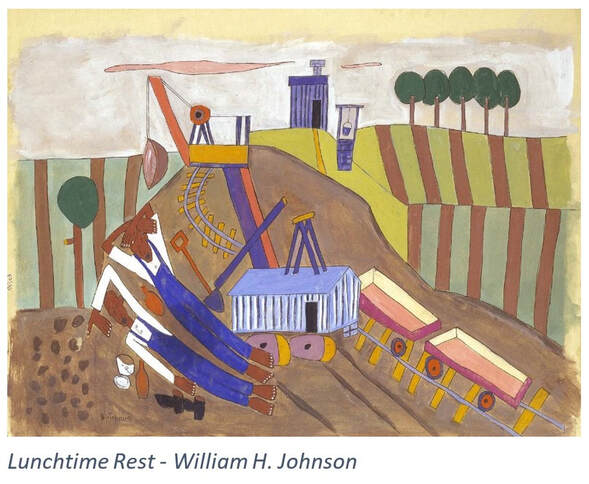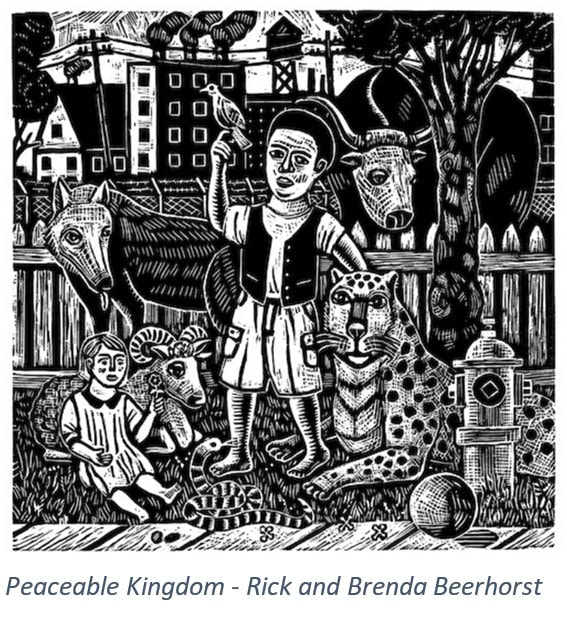 What would a new creation look like? Some imagine that The Song of Songs is an image of what life should have been like in the Garden of Eden: the joy of the two seeking out each other in the midst of creation; the animals and fruits and trees; without guilt and sin; just pure delight and joy. It may be hard to imagine in the midst of Delta Covid and masks and fires and floods and Afghanistan and all the things. At the same time, we know that all these things are not the life that God desires for us. How do we carve out this life of new creation within these times of trials? How have people with generational trauma from slavery and racism or poverty imagined a life of new creation: a life of beauty and joy and right relationships. A constant evaluation of what brings us joy may be it. Have we wandered into the world to be stained by consumerism, all the isms, not loving our neighbor? Does this bring us joy? Holy Moly. We need reminders to not fall into that trap. Our worship brings us together to remind us of these things: the holy things that God intends for us to experience to bring joy and delight and love for the world and its peoples and creatures and fauna and waters. "Arise, my love, my fair one, and come away; For now the winter is past, the rain is over and gone. The flowers appear on the earth; the time of singing has come..." Let us come together to worship God. Enter into worship.
0 Comments
 One of the many important lessons I learned during seminary was the idea of “minority reports.” No, not the movie. It was the knowledge of reports on stories particularly in the Hebrew scriptures. The minority reports give us another way of looking at the story, a way that is commonly overlooked. King Solomon is one of those characters that deserves the second look. My family bible had a picture of King Solomon in it. King Solomon: the righteous judge. Remember the story of the two women both claiming to be the mother of a baby? That picture formed my opinion of King Solomon. He was wise! And that is the majority report on King Solomon. The dedication of the temple seems pretty fantastic. But wait! Go back a few chapters in 1Kings and see all that is reported as happening. Beginning in chapter 4: how provisions were made for King Solomon’s household and what those provisions were. (Hint: one days worth was overwhelming) Chapter 5 speaks of preparations and materials for the temple. As Andrea reminded us, King Solomon did not build the temple himself. He conscripted forced labor out of all Israel: thirty thousand men. It was difficult labor, cutting great costly stones for the foundation of the temple. They were not paid for this labor. This would have been a great injustice for these men. Time and labor not for the benefit of their families. And, of course, the temple was not the only building. King Solomon’s home and other buildings along with all the vessels for them. Seriously, take a look. It is as if all these buildings show how grand King Solomon was! It is history written by the winners. But we know the rest of the story. The country divided and fell apart. What King Solomon thought was the thing to do as King was not a thing to help his people. When I read this now, I remember the Amos 5 reading: “I hate, I despise your festivals, and I take no delight in your solemn assemblies. Even though you offer me your burnt offerings and grain offerings, I will not accept them; and the offerings of well-being of your fatted animals I will not look upon. Take away from me the noise of your songs; I will not listen to the melody of your harps. But let justice roll down like waters, and righteousness like an ever-flowing stream.” This is not a minority report on any particular event, only on the emphasis on how those with much believing that their “muchness” shows favor from God. God’s justice and righteousness is about caring for the people which was not in King Solomon’s agenda. As we come to this dedication of God’s temple in our readings this Sunday, we will remember the rumblings of the “minority report.” All was not well, and the nation would suffer for it. Enter into worship.
 And Solomon said … Give your servant therefore an understanding mind to govern your people, able to discern between good and evil; ~1 Kings 3:6a, 9a How we need wisdom! We live in such a complicated and challenging time. The climate is at code red, as if we didn’t already know this before the latest UN report. Delta is on the rise, but vaccinations are lagging behind cynicism, misinformation, and death tolls, despite a world of knowledge at our fingertips. Housing security is fragile. And yet, hints of a fragile bipartisanship in the other Washington flash a glimmer of hope that solutions to vexing challenges are not out of reach. Pressures are everywhere. Live carefully, as wise people, making the most of our days, Ephesians advises, “for the days are evil” (Ephesians 5:16). And it is hard to disagree about that last part. Indeed wisdom is so valued because it is the enfleshment of our most precious hopes for the world and one another amidst a decidedly non-black-and-white existence and an uncertain future. Wisdom cuts through the noise. It forages among so much junk for the food that feeds us forever. It gets us to love enfleshed. Let us make the most of our days! Enter into worship.
We continue to keep our financial commitments to our mission partners and staff. If you are not yet able to join us, thank you for remembering to send in your financial pledges and offerings or donating here.
 Put away from you all bitterness and wrath and anger and wrangling and slander, together with all malice, and be kind to one another, tenderhearted, forgiving one another, as God in Christ has forgiven you. ~Ephesians 4:31-32 The scene is powerful, evocative, because it captures the paradox of our own experience. David, a “man after God’s own heart” seems, ironically, to be trapped in an endless cycle of struggle, including within his own family. After the episode with Bathsheba and her husband Uriah, Nathan delivers God’s judgment: “the sword shall never depart from your house” (2 Samuel 12:10). And here is perhaps the most heartbreaking example: Absalom, David’s son, who is trying to gain the kingdom from his father is struck down by David’s soldiers. The image is comical, if not for the tragedy of it. Absalom, riding on his mule, gets his head stuck between some branches, and is left “hanging between heaven and earth, while the mule that was under him went on” (2 Samuel 18:33). Absalom is not the only one. David wants it all—the might of a political dynasty, and his son spared. Indeed his grief at the loss of his son is so profound that he wishes he could trade places. But in the lead-up he believes he can be both a faithful father and a warrior-king. Perhaps David is a person after God’s own heart because his experience is so typical of the human experience with which God lovingly engages. He wants his family restored, but years of stubbornness, brutality, and vanity provides him with only an empty victory. Don't we all hang between heaven and earth, wrestling constantly with the gravity of our decisions and our actions as we consider who we hope to be in the world? Jesus, the manna of heaven for the sake of the world, invites us not to choose between heaven or earth, but to live for an earth as it is in heaven. Enter into worship.
We continue to keep our financial commitments to our mission partners and staff. If you are not yet able to join us, thank you for remembering to send in your financial pledges and offerings or donating here.
 “We must no longer be children, … blown about by every wind of doctrine … But speaking the truth in love, we must grow up … into Christ,” ~Ephesians 4:14, 15 When confronted by Nathan, David turns away from his sin and toward restoration. Jesus challenges the hungry crowds to settle not just for the next desperately needed meal, but for a “food that endures” and “gives life to the world.” It is enough of a challenge for us in these times to speak the truth in love to others. Our families, our most intimate relationships are frayed and even facts are disputed. But for those of us who are looking for the courage to, like David, keep a steady gaze toward the sins of our past—doing the work, say, of anti-racism for a justice that endures for the life of the world, it may even be a greater challenge to speak the truth in love to ourselves. Jesus says, “I am the bread of life. Whoever comes to me will never be hungry, and whoever believes in me will never be thirsty.” Come to this one for forgiveness and hope and life. Enter into worship.
We continue to keep our financial commitments to our mission partners and staff. If you are not yet able to join us, thank you for remembering to send in your financial pledges and offerings or donating here.
|
worshipYou'll find here links to weekly worship and, where applicable archived service videos. Archives
July 2024
Categories |
 RSS Feed
RSS Feed